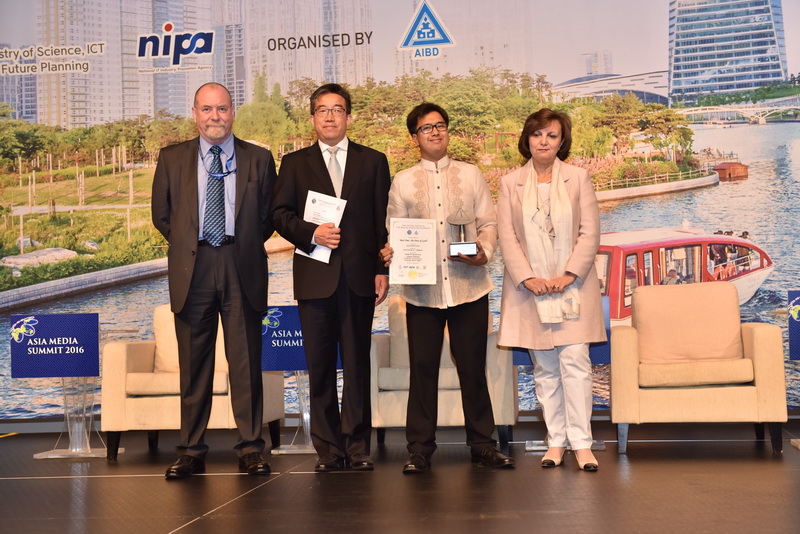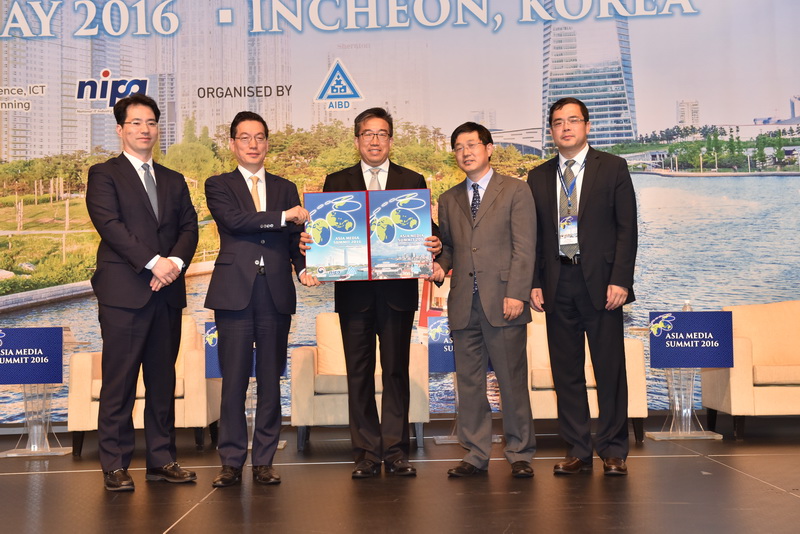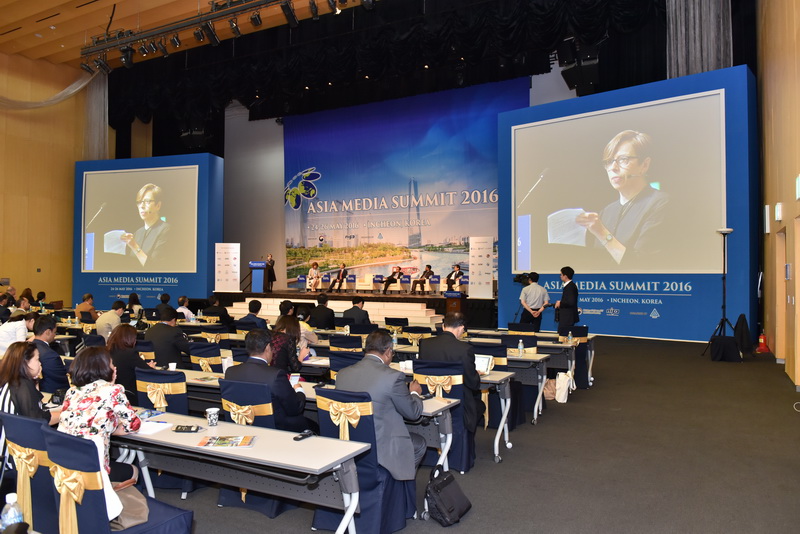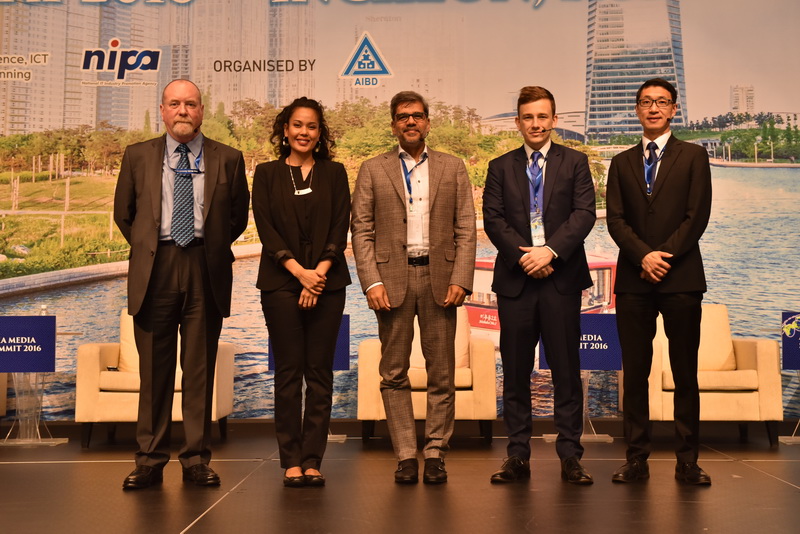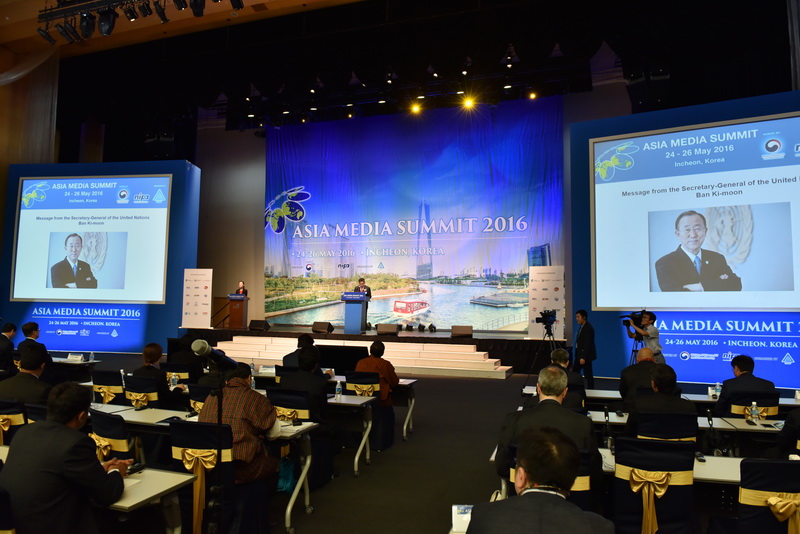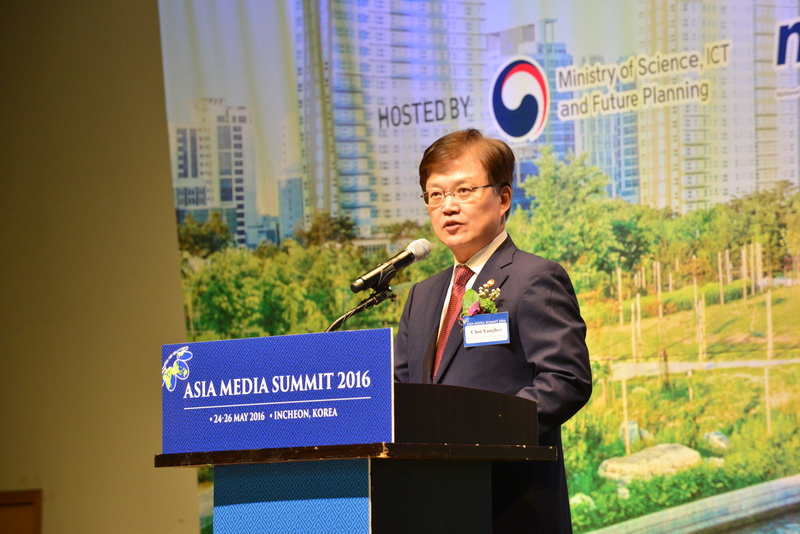The winners and runners-up of the World TV Awards 2016 were announced on the 25 May during the Asia Media Summit which took place in Incheon, Korea.
The winners and runners-up of the World TV Awards 2016 were announced on the 25 May during the Asia Media Summit which took place in Incheon, Korea.
"Reel Time: The Price of Gold”, broadcast by GMA Network, Inc Philippines and directed by Mr Jayson Bernard Santos won the Award under Humanity Category for the Best TV Documentary on "Promoting Children's Rights".
Mr Chang Jin, Director of AIBD, and Mrs Moufida Limam, Chief ASBU Director General Office Arab States Broadcasting Union (ASBU), who jointly announced the winner, presented a trophy and certificate to Mr Jayson Bernard Santos.
Mr John Maguire, Mr Chang Jin, Mr Jayson Bernard Santos and Mrs Moufida Limam
(From left to right)
For the announcement of the winner for the best TV Programme on "Encouraging Environmental Protection" under the category Science/Environment, Mr Chang Jin was joined by Mrs Dra. Rosarita Niken Widiastuti, President of AIBD General Conference & Director General of Information and Public Communication, Ministry of Communication and Information Technology (MCIT), Indonesia.
Mr Chang Jin and Mrs Dra. Rosarita Niken Widiastuti presented the trophy and certificate to Ms Lara Ariffin, the producer of "Sumatra’s Last Tigers", directed by Harun Rahman and broadcast by Novista Sdn Bhd, Malaysia.
For each category the winners will receive a cash prize of US$5,000.
Mr John Maguire, Mr Chang Jin, Ms Lara Ariffin and Mrs Dra. Rosarita Niken Widiastuti
(From left to right)
As the Chairperson of the jury for the World Television Awards 2016, Mr John Maguire, Director of International Relations and Cooperation of France Médias Monde, explained the selection process of the Awards.
The runner-up for the category Humanity was “The Way Home”, directed by Phan Thanh Phuong and broadcast by Vietnam Television (VTV), Vietnam.
"Search for Water", directed by Narmandakh Nagnaidorj and broadcast by Mongolian National Broadcaster (MNB), Mongolia, was the runner-up for the category Science/Environment.
Earlier in the day, a showcasing of selected World TV Awards entries, including the winners and runners-up programmes, was screened in front of all the delegates of the summit.
The World TV Awards 2016 are supported by Arab States Broadcasting Union (ASBU), Norwegian Broadcasting Corporation (NRK), Radio Television Malaysia (RTM) and Islamic Broadcasting Union (IBU), France Médias Monde, Asia-Pacific Institute for Broadcasting Development (AIBD)
World TV Awards 2016 – Winners & Runners-Up Announcement
The winners and runners-up of the World TV Awards 2016 were announced on the 25 May during the Asia Media Summit which took place in Incheon, Korea.
AMS 2017 in Qingdao City, China
Next year’s Asia Media Summit will be held in China again, this time in Qingdao, a beautiful seaside city located in the southeast part of Shandong Province.
Mr Yan Chengsheng, Deputy Director General of the State Administration of Press, Publication, Radio, Film & Television, China, announced that China will host the 14th AMS in 2017 during the closing ceremony of the Asia Media Summit on 26 May 2016 in Incheon, Korea. He formally accepted AIBD’s offer to host the event from AIBD Director Chang Jin.
Demands of Cutting-edge Content
For broadcasters to develop and sustain cutting-edge content, they must ensure it is interactive and produced and delivered on multi-screens. Such content must cater to more young people and also be part of the whole industrial chain.
This advice came from Mr Lv Peng, President of Shandong TV, China, who participated in the CEO Roundtable at the 13th Asia Media Summit on 26 May 2016 in Incheon, KoreaContent is Still King
Audiences will have many screens to watch news anytime and anywhere, and to draw their attention, particularly the young, broadcast journalists must have a story to tell, one that offers accuracy, analysis, and expertise, and must help audiences make sense of it.
This approach is how BBC World Service has operated in the world, says Ms Francesca Unsworth, Director, World Serive Group, BBC, United KIngdom, emphasising that “content remains queen or king.”
‘Invasion of Globalised Content’
Asian media is raising concerns about the ‘invasion’ of globalised content on various screens that threatens local content and may necessitate government regulation such as imposing a content quota system to preserve local cultures in the region.
In Bhutan, Bollywood programmes and Korean dramas and variety shows have invaded local content, says Kinley Dorji, a journalist and Secretary, Ministry of Information of Bhutan during the Moderated Debate at the 13th Asia Media Summit in Incheon, Korea.
ASBU’s Commits Support to AIBD Activities
The Arab State Broadcasting Union (ASBU) announced it will continue to support the Asia Media Summit, 2017, the World Television Awards and pledged more Arab participation in the AMS 2017 to be held in May in Qingdao, Shandong Province, China.
Ms Moufida Limam, Chief, of the ASBU Director-General’s Office, Tunisia, made the commitment on 25 May 2016 during the 12th AIBD/ASBU/ABU Media Partnership Committee Meeting that took place during the Asia Media Summit in Incheon, Korea.
Monetising Content
Broadcasters were urged to preserve good content by digitising and managing it efficiently in order to share this valuable resource to future generations and enable companies to make some money.
“So much good content is stored in some offices and libraries of government agencies, private companies and broadcast organisations that unless this is digitised, it will simply vanish in three to five years,” Mr Sanajay Salil, Managing Director, MediaGuru, India, said in his presentation during the plenary session on “Monetising Content and Dealing with Copyright Issues” at the 13th Asia Media Summit on 26 May 2016 in Incheon, Korea.
Harmonious Integration between Traditional and New media
Information Minister Hasanul Haq Inu of Bangladesh said on Tuesday traditional broadcasting and social media need not clash instead they should work towards harmonious integration in providing information, education and entertainment to audiences.
Despite being more professional, traditional broadcasting should be open to fine-tuning their products and services to response to the changing media landscape and audience needs, the Minister said.UN Chief Urges Better Protection for Independent, Free Media
UN Secretary General Ban-Ki-Moon expressed Tuesday his concern about the “increasingly restrictive environment for media workers in many countries,” saying that constraints on freedom of expression are shackles on progress itself.
“I will continue to urge all governments, politicians, businessmen, and citizens to commit to nurturing and protecting an independent, free media,” Mr Bank-Ki-Moon said in his message to some 300 broadcasters from Asia-Pacific attending the 13th Asia Media Summit (AMS) in Incheon, South Korea.Asia Pacific to Lead Development of Global Broadcasting Content
Mr. Choi Yanghee, Korean Minister of Science, ICT and Future Planning (MSIP) said on Tuesday that the Asia-Pacific region, home to four billion people and the world’s dynamic economy will be able to leverage its long history and rich cultural heritage to lead the development of global broadcasting content.
“We must continuously produce innovative and new media content to create added value and bring more joy to audience,” Minister Choi said in his keynote address at the inaugural session of the 13th Asia Media Summit (AMS) held in Incheon, Korea.

